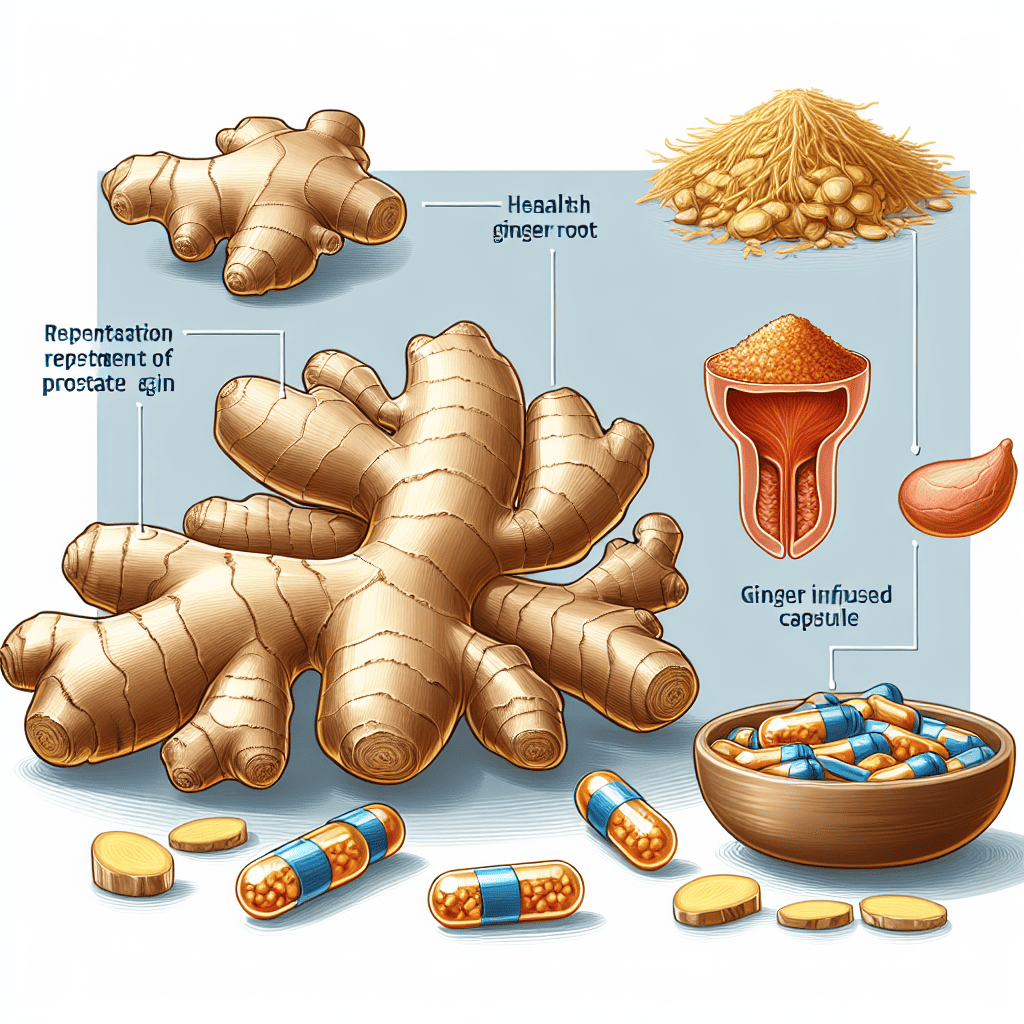Introduction: Ginger is gaining recognition as a potential natural remedy for prostate diseases, complementing traditional medical treatments. This article delves into the advantages, drawbacks, and correct application of ginger in managing prostate issues, offering insights for those considering alternative or supplementary approaches to prostate health.
Table of Contents
Prostate Treatment with Ginger
Exploring the role of ginger in treating prostate diseases.
- Importance of Consulting a Specialist:
Ginger, a common kitchen ingredient with various health benefits, has been recognized for its potential to alleviate symptoms related to prostate disorders. It possesses anti-inflammatory properties that may help reduce inflammation in the prostate gland and mitigate discomfort associated with conditions such as prostatitis or benign prostatic hyperplasia (BPH). However, before incorporating ginger into a treatment plan for prostate issues, it is imperative to first consult with a qualified healthcare provider. This precaution is vital to ensure that ginger will not interfere with any ongoing medications or treatments and to determine the appropriate dosage for individual needs.
Consulting with a healthcare provider before using ginger for prostate ailments is especially crucial for individuals with pre-existing health conditions or those taking medications that may interact adversely with ginger. While ginger is generally considered safe for most people when consumed in moderate amounts, it can potentially cause side effects or complications in certain situations. For instance, ginger may have blood-thinning properties, which could be problematic for individuals on blood-thinning medications or those with bleeding disorders. By seeking professional medical advice, individuals can receive personalized guidance tailored to their specific health circumstances and mitigate any potential risks associated with the use of ginger for prostate disorders.
In addition to potential interactions with medications, consulting a healthcare provider before using ginger for prostate issues can also help in determining the optimal form of ginger and dosing regimen based on individual needs. Ginger can be consumed fresh, dried, as a supplement, or in the form of tea, and the effectiveness of each form may vary depending on the condition being addressed. Furthermore, determining the right dosage of ginger is essential to ensure its beneficial effects while minimizing the risk of adverse reactions. By working in collaboration with a healthcare professional, individuals can make informed decisions about incorporating ginger into their treatment plan for prostate disorders, enhancing the likelihood of a safe and effective outcome.
- Benefits of Ginger in Prostate Treatment:
Ginger is a root with powerful antioxidant properties, containing bioactive compounds that help protect cells from damage caused by free radicals. Its antioxidants can help reduce oxidative stress in the body, which is linked to various chronic diseases, including prostate problems. By incorporating ginger into your diet, you can potentially mitigate the risk of developing prostate issues and manage existing conditions due to its protective effects.
Furthermore, ginger is well-known for its anti-inflammatory properties, which can be particularly beneficial for individuals suffering from prostate problems. Inflammation plays a significant role in the development and progression of prostate issues, and by consuming ginger regularly, you may help alleviate inflammation in the prostate gland. This natural anti-inflammatory effect can aid in reducing symptoms associated with prostate conditions and improve overall prostate health.
Research suggests that ginger may have a positive impact on prostate health through various mechanisms. For instance, some studies indicate that ginger may inhibit the growth of prostate cancer cells, potentially slowing down the progression of the disease. Moreover, ginger’s anti-inflammatory properties can help alleviate symptoms such as frequent urination, urinary retention, and discomfort. By leveraging the antioxidant and anti-inflammatory properties of ginger, individuals with prostate concerns can explore natural and complementary approaches to support their overall well-being.
Daily Dose and Preparation Methods
Understanding the recommended daily dose and preparation techniques when using ginger for prostate issues.
- Daily Dose:
Ginger, a widely used spice and herbal remedy, has been recognized for its potential health benefits. Clinical trials have indicated that consuming ginger in amounts ranging from 170 mg to 1 g could be beneficial. This dosage is typically divided into 3 to 4 servings throughout the day to maintain a steady concentration of the active compounds in the body. The flexibility in dosage allows individuals to tailor their intake based on their specific health needs and preferences.
To make ginger consumption more convenient, supplement forms have been developed to provide standardized doses. These supplements are commonly available in strengths of 250 mg or 500 mg per dose, which align with the recommended dosages observed in clinical trials. By offering different potencies, consumers have the option to choose a dosage that best suits their requirements. Additionally, the availability of varied strengths makes it easier for individuals to follow the suggested intake frequencies without the need for continuous measuring or preparation. Ginger supplements in these standardized amounts make it simpler for people to incorporate the herb into their daily routine for potential health benefits.
It is essential to note that individual responses to ginger may vary, and consulting with a healthcare provider is advisable before starting any new supplement regimen. Factors such as age, existing health conditions, and concurrent medications can influence how ginger is metabolized in the body and its potential effects. A healthcare professional can provide personalized guidance on the appropriate dosage of ginger based on individual health needs and circumstances. Moreover, they can monitor any interactions or side effects that may arise from ginger consumption, ensuring its safe and effective use as a natural remedy or supplement.
- Preparation Methods:
Ginger, a widely-used and versatile herb, can be seamlessly integrated into daily routines through a variety of methods. One popular way is by consuming ginger teas, which provide a comforting and soothing way to enjoy the herb’s benefits. Ginger can also be added to juices or smoothies, bringing a zesty kick to these beverages while enhancing their nutritional value. Additionally, ginger supplements are available in various forms like capsules or powders, offering a convenient way to incorporate this powerful herb into one’s diet.
Moreover, aromatherapy utilizing ginger essential oil can be a rejuvenating and invigorating experience. The spicy and warm aroma of ginger can help uplift moods, reduce stress, and promote mental clarity. In massage oils, ginger can be used to provide a warming sensation that can help soothe muscle aches and improve circulation. However, it is essential to seek professional guidance when using ginger in aromatherapy or massage oils to ensure proper dilution and application for safe and effective use.
Tailoring the approach to incorporating ginger into one’s routine is crucial as individual preferences and health conditions vary. Consulting with a healthcare provider or a qualified herbalist can help determine the most suitable method and dosage of ginger for specific needs. Professional guidance can also help identify any potential interactions with medications or health concerns, ensuring that the integration of ginger into one’s routine is both safe and beneficial. By customizing the approach and seeking expert advice, individuals can fully experience the diverse benefits of ginger while ensuring a holistic and well-rounded wellness routine.
Risks and Side Effects
Exploring the potential risks and side effects of using ginger for prostate treatments.
- Potential Risks:
Ginger, a commonly used spice and medicinal herb, offers an array of health benefits when consumed in appropriate amounts. It is known for its anti-inflammatory and antioxidant properties, and is often used to alleviate nausea, aid digestion, and reduce muscle pain. However, exceeding the recommended dosage of 5 grams a day can result in adverse effects. Oral irritation is a common side effect that may occur, leading to discomfort in the mouth and throat. Additionally, excessive consumption of ginger can cause upset stomach and heartburn, particularly in individuals with sensitive digestive systems. It’s crucial to be mindful of the dosage and avoid overconsumption to prevent these issues.
Another important consideration when using ginger is its potential interactions with medications and impact on blood clotting. Ginger has natural blood-thinning properties, which can be beneficial for individuals with certain health conditions. However, if you are taking blood-thinning medications or have a bleeding disorder, it’s essential to consult with a healthcare provider before incorporating ginger into your routine. The herb’s effects on blood clotting can increase the risk of bleeding when combined with anticoagulant drugs or if you have a clotting disorder. Your healthcare provider can provide guidance on the safe use of ginger and help prevent any adverse interactions.
Furthermore, while ginger is generally safe for most people when consumed in moderate amounts, using it topically can lead to skin irritation in some individuals. Allergic reactions to ginger applied on the skin may cause redness, itching, or a rash. It’s advisable to perform a patch test before applying ginger topically to ensure that you do not experience any adverse effects. If you notice any skin irritation or discomfort after using ginger externally, discontinue its use and consult a dermatologist if necessary. By being mindful of the potential side effects and interactions of ginger, you can safely incorporate this versatile herb into your diet and wellness routine.
- Common Side Effects:
Ginger, a widely used spice and medicinal herb, contains bioactive compounds that can have various effects on the body. When incorporated into the diet or used for medicinal purposes, some individuals may experience certain adverse reactions. These reactions can include oral irritation, which may manifest as a tingling sensation or mild burning in the mouth. In some cases, individuals may also experience upset stomach, heartburn, and bloating after consuming ginger. These symptoms can be unpleasant and may require careful monitoring and management when ginger is a part of a prostate treatment plan.
To prevent and address potential adverse reactions to ginger intake, individuals looking to incorporate ginger into their prostate treatment regimen should exercise caution and be aware of their body’s responses to this herb. It is crucial to start with small amounts of ginger and gradually increase the dose, allowing the body to adjust and minimizing the risk of experiencing negative effects. Additionally, consulting with a healthcare provider, such as a doctor or a nutritionist, before using ginger for medicinal purposes can provide valuable guidance and ensure that any existing health conditions or medications are taken into consideration. This step is particularly important for individuals with prostate issues or sensitive digestive systems.
Furthermore, while ginger has been studied for its potential health benefits, including anti-inflammatory and antioxidant properties that may be beneficial for prostate health, it is essential to recognize that every individual is unique. What works well for one person may not have the same effects on another. Therefore, maintaining open communication with healthcare professionals and being vigilant about monitoring any reactions to ginger can help personalize treatment plans and optimize outcomes. By staying informed, practicing mindfulness in ginger consumption, and seeking professional advice when needed, individuals can harness the potential benefits of ginger while minimizing the likelihood of experiencing adverse effects during prostate treatment.




